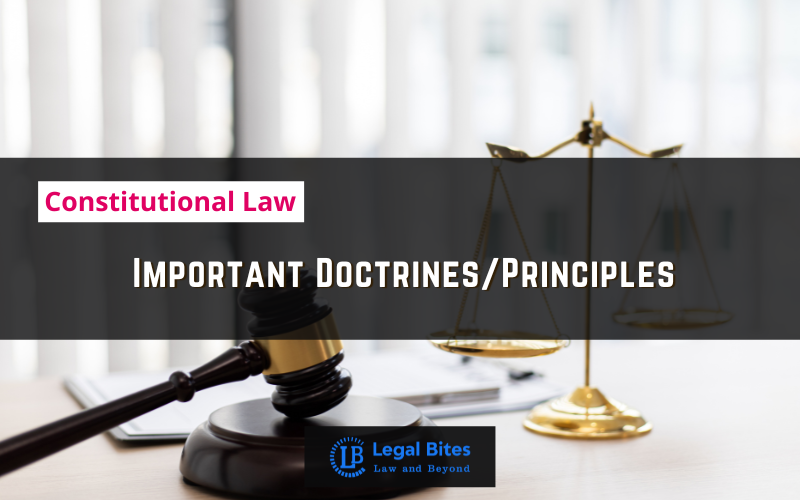Unveiling Constitutional Morality in India
Overview: Unveiling Constitutional Morality in India Introduction What constitutes Constitutional Morality and what are its sources? Supreme Court and Constitutional Morality Conclusion Constitutional Morality refers to a moral obligation of an individual to uphold the constitutional values with utmost dignity without any compromise and be faithful towards it. It means adherence of the core principles of the constitution… Read More »
;
Overview: Unveiling Constitutional Morality in India Introduction What constitutes Constitutional Morality and what are its sources? Supreme Court and Constitutional Morality Conclusion Constitutional Morality refers to a moral obligation of an individual to uphold the constitutional values with utmost dignity without any compromise and be faithful towards it. It means adherence of the core principles of the constitution by an individual in a democracy. Without effective...
Overview: Unveiling Constitutional Morality in India
- Introduction
- What constitutes Constitutional Morality and what are its sources?
- Supreme Court and Constitutional Morality
- Conclusion
Constitutional Morality refers to a moral obligation of an individual to uphold the constitutional values with utmost dignity without any compromise and be faithful towards it. It means adherence of the core principles of the constitution by an individual in a democracy. Without effective constitutional morality, the manoeuvre of the constitution becomes erratic, capricious and arbitrary. It is a seed that has to be cultivated into the minds of the citizens nevertheless have to e furthered by an independent judiciary in function.
This article tends to draw a distinction between the constitutional democracy vis-à-vis populist democracy and how India has moved from the former to the latter and conversed in the recent past.[1] The article also narrates the two uses of constitutional morality – firstly, a counterpoise to popular morality and secondly, as a reincarnation of the doctrine of basic structure and thereby evaluating and analyzing the soul, conscience or the spirit of the constitution.
Introduction
“Constitutional morality is not a natural sentiment. It has to be cultivated. We must realize that our people are yet to learn it.”[2]
The doctrine originates from George Grote’s History of Greece and Ambedkar took learning from it and introduced it in India. It is not merely constitutional morality but effective one wherein there is coordination between individual conflicting interests and administrative cooperation to harmoniously resolve the conflict. The rationale behind laying down the entire administrative structure in the constitution itself and not entrusting this power with the legislature was to ensure that the no rights or restriction are created beyond ha is provided for in the constitution as the legislature is yet to cultivate and learn the principles of constitutional morality.[3]
The meaning of the word morality is subjective and can vary in different circumstances and therefore, it was important to provide the same in the constitution. However, the Judiciary cannot always provide for solutions by browsing through the articles instead in situations of deadlock it is guided by political morality, constitutional spirit and ethics of the democracy.
In India, Constitutional Morality refers to the inherent morality in the constitutional structure that goes beyond the literal interpretation of the text; instead, it dwells into the spirit of the constitution. It refers to those implied norms which are to be adhered to even if they are not present in black letter of law. To identify what forms constitutional morality, the genesis, that is, the Constitutional Assembly Debates can be referred to.[4]
Although, easier said than done. The concept of Basic structure that was introduced in India around five decades by the judiciary continues to define its scope and characteristics with new interpretations and in such a scenario to introduce and employ an abstract doctrine like constitutional morality for the purposes of interpretation have its own pros and cons.
What constitutes Constitutional Morality and what are its sources?
The Delhi High Court while deciding the case of Naz Foundation[5] addressed the issue that how the penultimate aim of a democracy is to cultivate constitutional morality and dismiss the notion of popular or societal morality.[6] An individual’s rights and obligations are not subject to the approval of the social/popular morality or what people and society think is right, instead, the rights and obligations are guided by the constitutional morality either explicitly provided for in the constitution like the fundamental and the constitutional rights or inherent in the soul and spirit of the constitution and recognized through the interpretations by the judiciary. It is imperative that when the court decides an issue, it should be guided by constitutional morality and not popular or majoritarian morality.[7]
Even though this doctrine is still in its nascent stage in India but the sources of constitutional morality which one can contemplate are as follows – firstly, the Test of the Constitution; secondly, Constitutional Assembly Debates; thirdly, Rule Of Law; fourthly, events that took place at the time of framing of the constitution in India; and lastly, the case law history and the decisions today. With the passage of time as the doctrine unveils there is a possibility of addition or deduction of the sources mentioned above.
Supreme Court and Constitutional Morality
It is imperative to note that the Supreme Court has founded its latest decisions on the doctrine of constitutional morality as a touchstone. For the first time in 2009, the doctrine was introduced by the Delhi High Court in the Naz Foundation decision[8] while testing the constitutionality of section 377 of the Indian Penal Code, 1860. And thereafter it has been relied upon by the Supreme Court in the case of Triple Talaq, right of the LGBTQA community and freedom of sexual orientation, right to privacy, decriminalizing adultery, right of women to enter the Sabarimala temple, etc.[9] In all these cases the objective was to either further the constitutional rights of the parties or to invalidate the existing laws that are not in line with the constitutional spirit.
In case of Shayara Bano[10] (Triple Talaq Case), the issue was to declare triple talaq as a null and void form of talaq as most of the Islamic countries have done away with this practice and it was discriminatory to the women belonging to this religion. Matters of divorce are related to the institution of marriage which is a private matter between the parties and more so the religion and faith of both the parties were also involved. However, the court took the aid of the doctrine of constitutional morality and declared this form of talaq as null and void and such talaq will not lead to dissolution o marriage. However, this decision had an impact only on a handful of members in the society who practised Islam and abused this form of divorce.
Thereafter, in case of Navtej Singh Johar[11] wherein section 377 of the Indian Penal Code, 1860 was read down to the extent of decriminalizing consensual sexual intercourse between two adult homosexuals in private. Here, the court apologized for the decades of injustice that was done to the third gender and explicitly held that the notions of morality cannot be based on that of the society or that of the majority rather the notions of constitutional morality are at the highest pedestal and have to be obliged. Additionally, the right to choose the sex and sexual orientation have been upheld by the court. It declares homosexuality as moral and directs the state machinery to abstain from uncalled for interference by using criminal law against such individuals. Even though this judgment is very progressive it doesn’t cultivate the seed of constitutional morality, with respect to homosexuality, in citizens in order to change their perspective towards the third gender.
In furtherance of this, in case of Justice K.S. Puttaswamy[12] the right to privacy was held to a fundamental right under Article 21 of the Indian constitution giving an individual the right to choose and keep personal details out of the reach of the police in light of the spirit of the constitutional. However, it is imperative to note that even after the application of such doctrine and declaration of the right to privacy as a fundamental right it is not an absolute right and is subject to certain exceptions like national interest, larger public interest, etc.
Also, in the case of Joseph Shine[13] Adultery was decriminalized on the rationale that it is discriminatory to the women and treats them as the property/chattel of the husband in the patriarchal society. However, even though the aid of constitutional morality was taken, adultery, in the present scenario, is still considered to be socially immoral, not an act acceptable by law, publically immoral as it introduces infidelity and it continues to be a ground for divorce.
Lastly, in case of Indian Young Lawyers Association[14] wherein the issue of entry of women of certain age was restricted at Sabarimala Temple and provided for in state law. The court in light of constitutional morality held that every individual belonging to the same faith should recalibrate their perception of God. Additionally, the court also polished the underline principle under abolishment of untouchability and declared that even these women who were being restricted from entering in the temple had a right to religion under Article 25 of the Indian Constitution. However, the case did not involve much public discourse as in case of triple talaq (both being based on the faith of an individual) as the prohibition on women entering the temple was not absolute but only partial.
Another interesting fact is that this could hold the right to privacy as a fundamental right and thereafter don’t judgments like triple talaq and Sabarimala case lead to invasion of privacy of an individual’s faith? Primarily does it only mean that the constitutional morality of one bench of the Supreme Court is more righteous than the constitutional morality of the other bench? Constitutional morality, henceforth, is a dangerous weapon and has to be used with utmost care and caution.
Conclusion
The fact that constitutional morality as a concept is not flawed isn’t debated but the point of deliberation, in essence, is that whether the determination of the constitutionality of existing laws and of constitutional rights by the courts on the basis of doctrines which are not explicitly provided for in the constitution (basic structure doctrine, the doctrine of constitutional morality, etc.) and which are subjective and incapable of precise description is justified or not even on the perceived notion that the legislature, a pillar of democracy, has failed to fulfil its obligation in an idealistic democratic country.
[1] Andre Beteille, Constitutional Morality, Democracy and its Institutions, Oxford Scholarship Online, 2012 available at 10.1093/acprof:oso/9780198080961.001.0001
[2] B.R. Ambedkar, Speech Delivered on 25 November 1949’ in The Constitution and Constituent Assembly Debates, p. 174.
[3] Abhinav Chandrachud, The Many Meanings of Constitutional Morality, 2020 available at SSRN: https://ssrn.com/abstract=3521665 or http://dx.doi.org/10.2139/ssrn.3521665
[4] Andre Béteille, Constitutional Morality, Economic and Political Weekly, vol. 43, no. 40, 2008, pp. 35–42 available at JSTOR, www.jstor.org /stable/40278025
[5] Naz Foundation v. Govt. of NCT of Delhi, (2009) 160 Delhi Law Times 277
[6]Pratab Bhanu Mehta, What is Constitutional Morality?, available at https://www.india-seminar.com/2010/615/615_pratap_bhanu_mehta.htm
[7] Aradhana Cherupara Vadekkethil, Constitutional Morality in the Indian Constitution by Surabhi Shukla, University of Oxford, 2018, available at https://www.law.ox.ac.uk/current-students/graduate-discussion-groups/south-asian-law-discussion-group/blog/2018/03-0
[8] Naz Foundation v. Govt. of NCT of Delhi, (2009) 160 Delhi Law Times 277
[9]Pratab Bhanu Mehta, What is Constitutional Morality?, available at https://www.india-seminar.com/2010/615/615_pratap_bhanu_mehta.htm
[10] Shayara Bano v. Union of India, (2017) 9 SCC 1
[11] Navtej Singh Johar v. Union of India, AIR 2018 SC 4321
[12] Justice K.S. Puttaswamy v. Union of India, (2017) 10 SCC 1
[13] Joseph Shine v. Union of India, 2018 SCC OnLine SC 1676
[14] Indian Young Lawyers Association v. State of Kerala, 2018 SCC OnLine SC 1690




